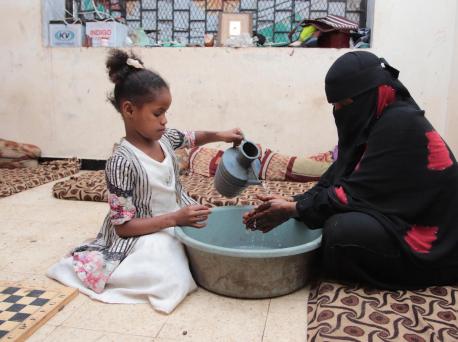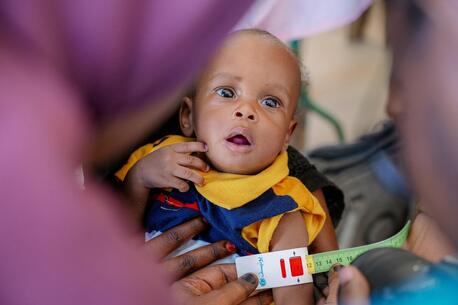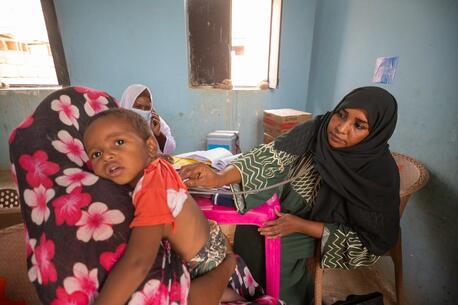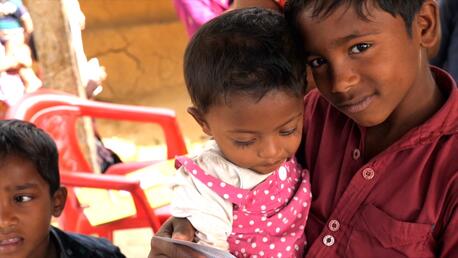
Ramadan in War-torn Yemen: Hoping for Better Days Ahead
An embattled nation's already fragile health care system faces a new threat: the novel coronavirus.
Throughout the Muslim world, the holy month of Ramadan is a time for fasting and reflection during the day and getting together with family for a celebratory meal at night. But five years of brutal civil war have pushed Yemen to the brink of collapse. The falling Yemeni Rial, disruptions to food imports and salary payments, and rising food prices have left an estimated 17 million people in need of humanitarian food assistance.
Yemen's youngest children have no memory of a time before the violence began. Fear and uncertainty have become a way of life. After a recent unilateral ceasefire was announced, fighting only escalated.
Children in #Yemen share their #COVID19 anxieties through drawings. @UNICEF_Yemen are working around the clock to prepare for & respond to the risk that COVID poses to children & their families across Yemen pic.twitter.com/LyRcHikGCC
— UNICEF Yemen (@UNICEF_Yemen) April 16, 2020
And now, there's another threat on the horizon: the novel coronavirus. Health workers are preparing for another battle that could overwhelm an already fragile health care system. Only one case of COVID-19 has been confirmed in Yemen to date, on April 10, but testing facilities are severely limited. More than half the country's hospitals and clinics have been destroyed or closed.
UNICEF has been on the ground in Yemen since the conflict began, providing urgently needed assistance for children
UNICEF has been on the ground in Yemen since the conflict began, working closely with partners to treat severely malnourished children, distribute basic hygiene kits and provide safe water and sanitation services, health care and immunizations, education, physical protection and psychological support to children.
UNICEF-supported health care workers go out into the communities to identify those who are sick, malnourished or both, and refer them for facility care. “UNICEF is striving to help strengthen the system, to reach every child with an integrated package of essential health services,” says Dr. Nuzhat Rafique, a UNICEF health manager in Yemen.
On March 29, 2020, women work at a cash payment distribution site in Sa’ada, Yemen, serving Social Welfare Fund (SWF) beneficiaries. Countrywide, some 9 million Yemenis rely on cash assistance to meet their basic needs. The women wear gloves to protect against the possible spread of coronavirus; a poster on the wall behind them offers instructions on how to stay safe and healthy during the COVID-19 outbreak © UNICEF/UNI320444/
A multipurpose cash transfer program helps the poorest families cover basic food, health and education costs. By July 19, 2019, nearly 9 million people across Yemen had been reached with emergency cash assistance in the fifth payment cycle by UNICEF to help meet their urgent needs. But faced with violence, food insecurity and now the prospect of a pandemic, what will the holy month of Ramadan be like this year in Yemen?
We fast in the daytime and starve in the night.
Instead of resting during the daytime during Ramadan, many parents in Yemen are already accustomed to spending their days searching for food to feed their family at night. "I am exhausted and thirsty because of walking, and I have been fasting without a good breakfast," a tearful mother in Sana'a told a reporter for Al Jazeera in 2017. "I used to live with dignity in my house, and Ramadan was my best month. The war has deprived us of joy every day. Last Ramadan was fine, but this one is very tough. We fast in the daytime and starve in the night."

The civil war has left two-thirds of Yemen's population without enough to eat. Worried parents bring their malnourished children to a UNICEF-supported therapeutic nutrition center in Hudaydah, Yemen. © UNICEF/UN0276393/AlGhabr
And yet, despite the immense difficulties they face, families in Yemen will still look for reasons to give thanks during Ramadan. Those who have a little food to spare will give some to those who have none, and all will share their hopes for a safer, more peaceful future.
"It is enough for me that my daughter returned to the house alive and that she smiles and laughs," Hussein Ahmed said in 2019. He shares a tiny mud house in Hudaydah governate with his mother, his wife, their six children and three other families.

Four families share this tiny mud house covered in palm fronds in Hudaydah, Yemen. Every time it rains, they worry that the house may collapse. The civil war has devastated the country. © UNICEF/UN0276394/AlGhabri
In 2018, his baby daughter, Doa'a, was in critical condition, severely malnourished with complications of pneumonia and unable to breastfeed. Ahmed and his wife, Zahra Hassan Sulaiman, rushed her to a UNICEF-funded therapeutic nutrition center run by the Tayba Foundation in Hudaydah. The center provides integrated medical services for malnourished mothers and children, and an education program to help families learn how to keep their children healthy.

Doa'a was severely malnourished when her parents rushed her to a UNICEF-funded therapeutic nutrition center in Hudaydah, Yemen, where doctors saved her life. © UNICEF/UN0279211/AlGhabr
"When I looked at my daughter, I was pretty sure that she would not survive, but I didn't give up," Ahmed recalled. "I borrowed money and took her to the nearest health center, one hour away by car. I was afraid she would die before we reached the health center."
Doctors at the center gave Doa'a medicine and baby formula, and nursed her back to health. For 15-year-old Mareiah, her baby sister's survival was nothing short of a miracle. "When Doa'a was discharged from the health center, I didn't believe that she was alive until I saw her."
More support is needed to help UNICEF maintain key interventions in Yemen
The needs of children and families in Yemen continue to exceed current funding levels, however. More support is needed to help UNICEF maintain key interventions in the country — to continue protecting kids from the ongoing conflict, and helping them recover from traumas they may have suffered and to get on with their childhoods.
Your generous gift will help UNICEF reach vulnerable children during Ramadan.
Top photo: On April 4, 2020, Fatima pours water to help her mother wash her hands thoroughly, in a center for internally displaced persons in Aden, Yemen. © UNICEF/UNI320443/
HOW TO HELP
There are many ways to make a difference
War, famine, poverty, natural disasters — threats to the world's children keep coming. But UNICEF won't stop working to keep children healthy and safe.
UNICEF works in over 190 countries and territories — more places than any other children's organization. UNICEF has the world's largest humanitarian warehouse and, when disaster strikes, can get supplies almost anywhere within 72 hours. Constantly innovating, always advocating for a better world for children, UNICEF works to ensure that every child can grow up healthy, educated, protected and respected.
Would you like to help give all children the opportunity to reach their full potential? There are many ways to get involved.






